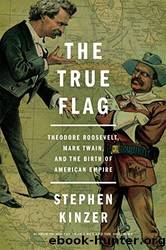The True Flag: Theodore Roosevelt, Mark Twain, and the Birth of American Empire by Kinzer Stephen

Author:Kinzer, Stephen [Kinzer, Stephen]
Language: eng
Format: epub
Tags: Politics, War, United States, Biography, History, Non-Fiction, Imperialism
ISBN: 9781627792172
Goodreads: 30833853
Publisher: Henry Holt and Co.
Published: 2017-01-24T08:00:00+00:00
8
What a Choice for a Patriotic American!
Scion of political royalty in Ohio, obese and widely admired, William Howard Taft enjoyed a remarkable rise. At Yale he had been a heavyweight wrestling champion. Back home, partly through the influence of his father, a former attorney general and secretary of war, he was named a prosecutor and then a judge. At the age of thirty-two he became the youngest-ever solicitor general of the United States. A decade later, in January 1900, he was serving on the United States Court of Appeals in Cincinnati and dreaming of a seat on the Supreme Court when he received an enigmatic telegram from President McKinley.
âI would like to see you in Washington on important business within the next few days,â it said.
The dramatic escalation of the Philippine War had shocked McKinley. By the time he wired Taft, seventy thousand American soldiers were in the Philippines, fighting a war that anti-imperialists had foreseen but few others expected. He had to decide how to govern the islands while ârebellionâ raged. The United States was new to the business of ruling foreign lands, and McKinley asked one of his confidants, Senator John Spooner of Wisconsin, for advice. Spooner studied various options and recommended that McKinley do what Jefferson had done after purchasing the Louisiana Territory: appoint a civilian governor to rule alongside the military commander. McKinley liked the idea.
âJudge, Iâd like you to go to the Philippines,â he told Taft as soon as their White House chat began.
Taft was taken aback. Later he wrote that McKinley âmight as well have told me that he wanted me to take a flying machine.â He was at heart a jurist, not adventurous by nature, and he worried that the tropics might not suit a man of his constitution.
âWhy, I am not the man you want,â Taft protested. âTo begin with, I have never approved of keeping the Philippines.â
McKinley surprised him by saying he agreed. âBut we have them,â the president reasoned, âand in dealing with them, I think I can trust the man who didnât want them better than the man who did.â
An awkward silence followed. Sensing Taftâs reluctance, Secretary of War Elihu Root, who had been listening quietly, offered a different kind of nudge. He appealed to Taftâs sense of patriotism and manly duty.
âYou have had an easy time of it, holding office since you were twenty-one,â Root said. âNow your country needs you. This is a task worthy of any man. This is the parting of the ways. You may go on holding the job you have in a humdrum, mediocre way. But here is something that will test you, something in the way of effort and struggle. And the question is, will you take the harder or the easier task?â
Still Taft resisted. To close this deal, McKinley had to produce the high card he had been saving.
Everyone in the room knew of Taftâs desire for promotion to the Supreme Court. Go to the Philippines, McKinley promised, and âif I last and the opportunity comes, I will appoint you.
Download
This site does not store any files on its server. We only index and link to content provided by other sites. Please contact the content providers to delete copyright contents if any and email us, we'll remove relevant links or contents immediately.
| Arms Control | Diplomacy |
| Security | Trades & Tariffs |
| Treaties | African |
| Asian | Australian & Oceanian |
| Canadian | Caribbean & Latin American |
| European | Middle Eastern |
| Russian & Former Soviet Union |
The Secret History by Donna Tartt(19085)
The Social Justice Warrior Handbook by Lisa De Pasquale(12190)
Thirteen Reasons Why by Jay Asher(8909)
This Is How You Lose Her by Junot Diaz(6885)
Weapons of Math Destruction by Cathy O'Neil(6279)
Zero to One by Peter Thiel(5801)
Beartown by Fredrik Backman(5751)
The Myth of the Strong Leader by Archie Brown(5507)
The Fire Next Time by James Baldwin(5442)
How Democracies Die by Steven Levitsky & Daniel Ziblatt(5218)
Promise Me, Dad by Joe Biden(5153)
Stone's Rules by Roger Stone(5087)
A Higher Loyalty: Truth, Lies, and Leadership by James Comey(4960)
100 Deadly Skills by Clint Emerson(4924)
Rise and Kill First by Ronen Bergman(4788)
Secrecy World by Jake Bernstein(4752)
The David Icke Guide to the Global Conspiracy (and how to end it) by David Icke(4717)
The Farm by Tom Rob Smith(4507)
The Doomsday Machine by Daniel Ellsberg(4490)
